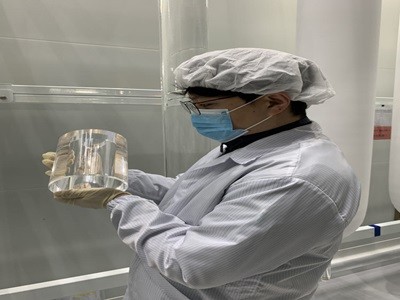| South Korean company has succeeded in localizing and manufacturing synthetic fused silica material that has been monopolized by Japanese companies. Import-substitution effect is expected to be huge for the semiconductor and display quartz glass markets.
STI (President Seo Tae-il) announced that it developed synthetic fused silica material along with Korea Ceramic Engineering and Technology (Director Yoo Gwang-soo) through an industry-university-research institute collaborative technology development project and has succeeded in mass-production of synthetic fused silica material.
Synthetic fused silica is a material made by liquefying gas that includes silicon or liquefied compound at high temperature. Unlike glass that includes many different components, synthetic fused silica is only made up of silicon dioxide and has little impurities and is often used for semiconductor and display processes.
Although synthetic fused silica is not part of items that are restricted by Japanese Government as part of its trade restriction on South Korea, it is a material that is monopolized by Japanese companies as 96% of South Korea’s synthetic fused silica market is owned by Japanese companies.
 <Manager Lee Ga-hyeong of STI’s laboratory is showing STI’s high-purity synthetic fused silica.> <Manager Lee Ga-hyeong of STI’s laboratory is showing STI’s high-purity synthetic fused silica.>Synthetic fused silica is used during a photolithography process just like photoresist, one of three technology materials which the Japanese Government has restricted since last July, and it is absolutely needed for EUV (Extreme Ultraviolet) photolithography process that is seen as a next-generation microfabrication process. Synthetic fused silica that is currently used in South Korea only comes from few Japanese companies such as Shinetsu, Nikon, and Tosoh.
STI used optical fiber manufacturing equipment and technology and a special method in order to develop manufacturing technology and manufacturing equipment for synthetic fused silica material. It even developed a gas mixer that can control properties of synthetic fused silica. It is expected that STI’s synthetic fused silica can be used to manufacture glass board or glass tube.
Synthetic fused silica material can also be used in other industries such as national defense and aerospace.
“Because the market was worth $975 million (1.16 trillion KRW) at the end of 2018, there will be a significant import-substitution effect.” said Manager Lee Ga-hyeong of STI’s laboratory. “We will be able to supply high-purity quartz glass requested by front-end industries such as semiconductor and display.”
STI made $57.9 million (68.9 billion KRW) in sales in 2018 and is looking to become a top-notch company that specializes in heat treatment.
Staff Reporter Jung, Jaehoon | jhoon@etnews.com
<Source: Etnews> |